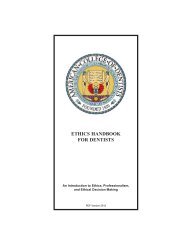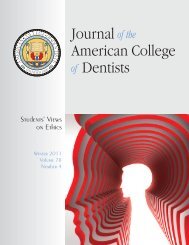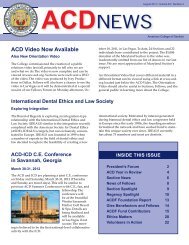JACD 71-4 - American College of Dentists
JACD 71-4 - American College of Dentists
JACD 71-4 - American College of Dentists
- No tags were found...
Create successful ePaper yourself
Turn your PDF publications into a flip-book with our unique Google optimized e-Paper software.
Therefore, a dentist should not work on<br />
patients, but rather work with them.<br />
<strong>Dentists</strong> need to develop the teaching<br />
skills for educating patients about the<br />
condition <strong>of</strong> their mouth and teeth and<br />
oral health. These teaching skills are<br />
intrapersonal in nature, not dentotechnical.<br />
They involve careful listening,<br />
clinical flexibility, and sometimes<br />
persuasion. One natural way to do this<br />
well is to let the patient in on your<br />
thinking and nurture their interest in<br />
what you are doing. The principle <strong>of</strong><br />
respect for patient autonomy requires<br />
that the patient has the final say about<br />
what the dentist is to do for them. Of<br />
course that does not mean that patients<br />
should be going it alone; it is the dentist’s<br />
job to help them make wise choices in<br />
a relationship <strong>of</strong> respect.<br />
Principle 4: Mistakes Will Be Made<br />
This principle should come as no shock<br />
to the experienced dentist. Obviously, no<br />
one is perfect. Nonetheless, some dentists<br />
and many patients seem to have an<br />
unrealistic and perfectionist expectation.<br />
But bad things happen when people<br />
believe things that cannot possibly be<br />
true, and serious negative consequences<br />
derive from the false belief that doctors<br />
never make errors. First <strong>of</strong> all, it puts<br />
unnecessary pressure on the dentist;<br />
second, it creates a strong temptation for<br />
the dentist to be less than completely<br />
honest with patients. This principle is<br />
not a rationalization for carelessness,<br />
<strong>of</strong> course. <strong>Dentists</strong> must make sure to<br />
install as many fail-safe mechanisms as<br />
possible into their practice habits. But<br />
they must also be ready to take the<br />
inevitable errors in stride and manage<br />
them properly and effectively, which<br />
brings us to Principle 5.<br />
Journal <strong>of</strong> the <strong>American</strong> <strong>College</strong> <strong>of</strong> <strong>Dentists</strong><br />
Principle 5: Tell the Truth<br />
Here is a very important, but very<br />
challenging, guideline: never, ever tell<br />
a false thing to a patient (or a staff<br />
member, for that matter). Never, ever,<br />
in your whole pr<strong>of</strong>essional career. Aside<br />
from principled reasons for veracity,<br />
there are several instrumental or<br />
pragmatic reasons to tell the truth. Once<br />
you have told someone a lie, you have<br />
changed your relationship to them<br />
forever. You have switched from an<br />
authentic person-to-person relationship<br />
to the relationship <strong>of</strong> player-and-played.<br />
You now have to “work” that person<br />
forever. You have to maintain the lie and<br />
never let them in on the fact that you<br />
lied in the first place. You can never<br />
be truly authentic with them again.<br />
What a loss!<br />
The idea sounds logical and simple<br />
enough, but to follow the veracity guideline<br />
permanently—and in every situation<br />
where something other than the truth<br />
might make life easier—that is extremely<br />
challenging. <strong>Dentists</strong> obviously know<br />
they are to tell patients the truth. But<br />
doing so is not always so easy. There is<br />
the potential for embarrassment, for loss<br />
<strong>of</strong> revenue, and <strong>of</strong> course the potential<br />
for lawsuits. But the fifth principle<br />
proposes that a dentist should not let<br />
those things prevent the truth from<br />
being told. It will take creativity and<br />
sometimes humility, but always find a<br />
way to be honest in your work. This is<br />
related to the next principle.<br />
Principle 6: Be Assertive<br />
As a psychologist in the bioethics arena,<br />
one <strong>of</strong> my pr<strong>of</strong>essional duties over<br />
the past decade has been to <strong>of</strong>fer<br />
psychological, ethical, and behavioral<br />
help to dentists who have lost their<br />
licenses. In an attempt to better understand<br />
these practitioners I recently I took<br />
a look back at my files to see if there<br />
Issues in Dental Ethics<br />
Once you have told<br />
someone a lie, you have<br />
changed your relationship<br />
to them forever. You have<br />
switched from an<br />
authentic person-to-person<br />
relationship to that <strong>of</strong><br />
player-and-played.<br />
55





